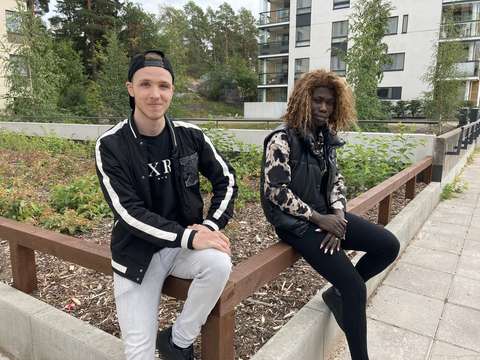First experiences of Finnish working life highlighted the strengths of young immigrants
Over the past summer, young immigrants attending basic education for adults got the chance to improve their working life skills and gain valuable experiences of success. The City of Espoo, Omnia, and the Union for Senior Services (VALLI) joined their forces to create activities that allow young people to use and develop their skills and take meaningful steps towards their career of choice and future.
Seven young people attending basic education for adults at Omnia met at the end of August to talk about the skills and knowledge they gained during the summer. When asked about their strengths and things that they are good at, many found the question difficult to answer.
These young Omnia students have only lived in Finland for a few years at most. The students’ nearly three-month summer holiday is long, and they tend to forget some of the things they learned during the school year. Finding a summer job can be difficult if you have just recently arrived in Finland. Because of this, opportunities have been created for young immigrants to participate in activities that support their integration and future employment.
Skills and self-confidence grow hand in hand
The pilot, which was successfully carried out the previous summer, inspired a follow-up project this June as VALLI organised a group-based work try-out at nursing homes run by Espoon lähimmäispalveluyhdistys ry. The operating model developed by VALLI unites senior citizens and young people in need of experience of working life. Young people learn how to interact with the elderly and to act as members of a work community. The project also improved their interactive and language skills.
“The residents were curious about us and asked a lot of questions. We played bingo, spent time outdoors and danced in a seniors’ disco”, participants remember, chuckling.
Many young people find it difficult to recognise and describe their strengths, but working at the nursing home helped them become more aware of their skills. Positive feedback also improved their self-esteem.
Testing skills in a real work environment
Nouh Safar Beek and Monika Toure, who participated in a nursing home work try-out last year and this summer, respectively, say that the Trainee programme was their first experience of Finnish working life. They have fond memories of their time at the nursing home.
Nouh remembers being initially very nervous about meeting and talking to the nursing home residents. However, the residents welcomed him with open arms, and soon he began feeling comfortable interacting with them. Residents liked Nouh’s calm demeanour and felt that he was a good listener and easy to talk to. Nouh values the experience. Instead of the planned four weeks, he stayed for eight. During that time, he got to know the residents quite well. A smiling Nouh shows a photo of one of the residents from the time they were young. The resident gave the photo to Nouh as a memento.
Monica felt comfortable approaching the elderly right from the start. She was praised for taking initiative and noticing situations where she could be of help. The nursing home residents loved Monika’s cheerful personality, and she was a popular dance partner at the seniors’ disco held for the residents. The work try-out also helped her understand what she wants to do in the future:
“I got to do many things and learned a lot. I felt useful – like I was in the right place. I want to study to be a practical nurse.”
Work try-outs are important for young people. This has become evident to social counsellor Anne-Maarit Pullinen from Espoo’s Immigrant Services. She works in basic education for immigrants.
“Work-try outs increase young people’s sense of permanence and trust in their own abilities. They have been able to experience success in tasks that differ from the tasks at school. They have started to take more responsibility and initiative – also at school. The young participants have valued the opportunity to speak Finnish.”
